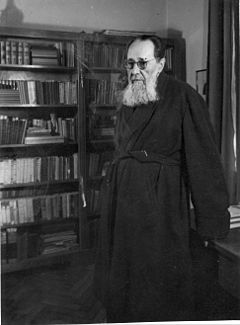Ion Agârbiceanu
| Ion Agârbiceanu | |
|---|---|
 |
|
| Born |
September 12, 1882 Cenade (Szászcsanád), Alsó-Fehér County, Kingdom of Hungary (Transylvania) |
| Died | May 28, 1963 (aged 80) Cluj, Romanian People's Republic |
| Pen name | AG, Agarbi, Alfius, Potcoavă |
| Occupation | priest, theologian, teacher, journalist, activist, politician |
| Nationality |
Austro-Hungarian Romanian |
| Period | ca. 1900–1962 |
| Genre | Psychological novel, novella, short story, sketch story, essay, feuilleton, prose poem, ballade |
| Literary movement |
Sămănătorul Poporanism |
Ion Agârbiceanu (September 12, 1882 – May 28, 1963) was an Austro-Hungarian-born Romanian writer, journalist, politician, theologian and Greek-Catholic priest. A native of Transylvania, he graduated from Budapest University, after which he was ordained. He was initially assigned to a parish in the Apuseni Mountains, which form the backdrop to much of his fiction. Before 1910, Agârbiceanu had achieved literary fame in both Transylvania and the Kingdom of Romania; his work was disputed between the rival schools of Sămănătorul and Poporanism.
Committed to social and cultural activism in Transylvania, Agârbiceanu spent the 1910s officiating near Sibiu, with a break during World War I that eventually took him deep into Ukraine. In 1919, he moved to Cluj, where he lived for most of the remainder of his life. After the war, he involved himself in both the political and cultural life of Greater Romania. He was voted into the Romanian Academy and assumed the office of Senate vice president under the National Renaissance Front dictatorship.
Agârbiceanu spent his last decade and a half under a communist regime that outlawed his church, an act in which he refused to cooperate. Much of his work, with its transparent Christian moralizing, proved incompatible with the new ideology, and was banned by communist censors; however, the regime found him useful for its image, and bestowed honors upon him. Agârbiceanu's full contribution has been made available since the 1990s, but he endures as a largely forgotten author, with the possible exception of his Apuseni-based novella, Fefeleaga.
...
Wikipedia
